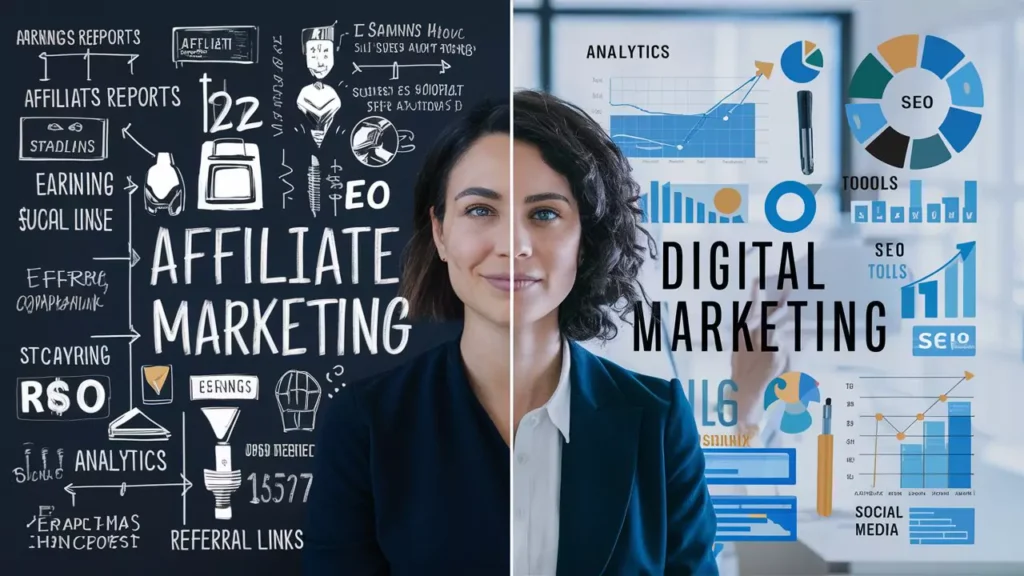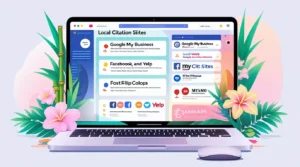Affiliate Marketing vs Digital Marketing: Strategies, ROI, and Effectiveness
In the ever-evolving landscape of online business, affiliate marketing vs digital marketing remains a hotly debated topic. These two strategies, though interrelated, serve distinct purposes, cater to different audiences, and employ unique tactics.
Jump to
ToggleFor businesses striving to achieve maximum ROI, understanding the difference between affiliate marketing and digital marketing is crucial.
In this comprehensive guide, we will explore their nuances, strategies, pros and cons, and effectiveness, helping you determine which approach suits your needs.
What is Affiliate Marketing?
Affiliate marketing is a performance-based strategy where businesses reward affiliates for driving traffic or sales. Affiliates use unique tracking links to promote products or services, earning commissions based on clicks, leads, or purchases.
Key Features of Affiliate Marketing:
- Performance-Based: Payment depends on measurable outcomes such as sales or leads.
- Third-Party Promotion: Relies on affiliates to advertise products.
- Low Upfront Costs: Businesses pay only for results, reducing financial risks.
What is Digital Marketing?
Digital marketing encompasses a wide range of online strategies to promote products or services. It includes SEO, PPC advertising, content marketing, social media, and email marketing, among others.
Key Features of Digital Marketing:
- Holistic Approach: Focuses on multiple channels to reach target audiences.
- Brand-Centric: Aims to build brand awareness and customer engagement.
- Customizable Campaigns: Strategies tailored to specific goals, such as traffic, engagement, or sales.
Affiliate Marketing vs Digital Marketing: A Direct Comparison
Let’s dive into a detailed affiliate marketing vs digital marketing comparison, examining their core differences.
| Criteria | Affiliate Marketing | Digital Marketing |
|---|---|---|
| Focus | Performance and conversions | Brand awareness, engagement, and conversions |
| Audience Targeting | Affiliates target niche audiences | Businesses target segmented demographics |
| Tools Used | Affiliate networks, tracking software | SEO tools, social media platforms, analytics tools |
| Cost Structure | Pay-per-performance | Variable (fixed, CPC, CPM, etc.) |
| Control | Limited (managed by affiliates) | Full control over campaigns |
| Effectiveness | High ROI but dependent on affiliate performance | Broader impact but requires strategic planning |
| Ease of Entry | Simple for beginners (via affiliate platforms) | Requires a learning curve for strategy execution |
Affiliate Marketing vs Digital Marketing Strategies
Affiliate Marketing Strategies:
- Choosing the Right Affiliates: Partner with affiliates who align with your brand values.
- Incentive Programs: Offer competitive commissions to attract top-performing affiliates.
- Tracking and Analytics: Use tools like Google Analytics to monitor performance.
- Optimizing Landing Pages: Ensure high-converting landing pages for affiliate traffic.
Digital Marketing Strategies:
- SEO Optimization: Rank higher on search engines for organic visibility.
- PPC Campaigns: Drive traffic with paid advertisements on platforms like Google Ads.
- Content Marketing: Publish engaging blogs, videos, and infographics to attract audiences.
- Social Media Engagement: Build a loyal following on platforms like Instagram, LinkedIn, and Twitter.
Affiliate Marketing vs Digital Marketing: Pros and Cons
Affiliate Marketing Pros:
- High ROI with minimal risk.
- Scalable as new affiliates join the program.
- Access to diverse audiences through affiliate networks.
Affiliate Marketing Cons:
- Limited control over messaging.
- Dependency on affiliate performance.
- Fraudulent activities like click spamming may occur.
Digital Marketing Pros:
- Full control over campaigns.
- Ability to target specific customer segments.
- Builds long-term brand value.
Digital Marketing Cons:
- Higher upfront investment.
- Requires expertise in various tools and strategies.
- Slower to show results compared to affiliate marketing.
Affiliate Marketing vs Digital Marketing: Effectiveness Across Industries
How Affiliate Marketing Excels Across Niches:
- Travel and Hospitality: Affiliate marketers promote hotels, flights, and tours, earning commissions for every booking.
- Health and Fitness: Affiliates partner with fitness brands to promote supplements, workout gear, and training programs.
- Technology and Gadgets: Tech bloggers review and promote gadgets, driving sales through affiliate links.
Digital Marketing in Diverse Sectors:
- Real Estate: Digital marketing enables virtual property tours, targeted ads, and lead generation.
- Education: Online courses and e-learning platforms leverage SEO and social media for wider reach.
- Retail: E-commerce brands rely on PPC campaigns and email marketing for customer retention.
Both strategies are highly adaptable, but choosing the right one depends on the industry’s needs and goals.
Affiliate Marketing vs Digital Marketing ROI
ROI in Affiliate Marketing:
Affiliate marketing delivers exceptional ROI, particularly for businesses operating on tight budgets. A small initial investment can yield high returns, as businesses only pay for successful conversions.
ROI in Digital Marketing:
Digital marketing, while requiring higher upfront costs, builds long-term value by increasing brand recognition, customer loyalty, and recurring revenue. Combining data analytics and A/B testing ensures that campaigns remain cost-effective.
Key Insight:
Businesses can maximize ROI by integrating affiliate marketing into their broader digital marketing strategy, using affiliate partnerships to complement other channels.
Affiliate Marketing vs Digital Marketing: Audience Targeting
Affiliate Marketing Audience Targeting:
Affiliates are often niche experts, bringing access to highly specific audience segments. For example:
- A travel blogger’s audience is ideal for promoting luggage or travel insurance.
- A fitness influencer’s followers are prime candidates for gym memberships and supplements.
Digital Marketing Audience Targeting:
Digital marketing offers advanced tools for precise audience segmentation. Platforms like Google Ads and Facebook allow businesses to target users based on:
- Demographics
- Interests
- Online behavior
This ensures that campaigns reach the right people at the right time, increasing conversion rates.
Affiliate Marketing vs Digital Marketing: Success Rate
The success rate of both strategies depends on execution, industry, and target market.
Affiliate Marketing Success Factors:
- Choosing the Right Affiliates: Affiliates with loyal, engaged audiences tend to deliver better results.
- Compelling Incentives: High commissions motivate affiliates to prioritize your brand.
- Transparent Communication: Clear guidelines and prompt payments foster trust and long-term partnerships.
Digital Marketing Success Factors:
- Optimized Content: High-quality, SEO-friendly content improves visibility and engagement.
- Consistent Branding: Uniform messaging across channels builds trust and recognition.
- Continuous Testing: Regular A/B testing refines strategies for better performance.
Affiliate Marketing vs Digital Marketing for Small Businesses
Small businesses often face resource constraints, making it essential to choose the most impactful marketing strategy.
Why Affiliate Marketing Works for Small Businesses:
- Low Entry Barriers: Starting an affiliate program requires minimal investment.
- Rapid Results: Affiliates drive immediate traffic and sales.
- Scalability: Businesses can expand partnerships as they grow.
How Digital Marketing Benefits Small Businesses:
- Local SEO: Attracts nearby customers searching for specific services.
- Social Media: Builds community engagement without significant costs.
- Email Marketing: Retains customers through personalized communications.
Affiliate Marketing vs Digital Marketing Platforms
Top Platforms for Affiliate Marketing:
- Amazon Associates: Best for retail and consumer products.
- ClickBank: Focuses on digital products like e-books and online courses.
- Rakuten Marketing: A global platform with diverse affiliate options.
Top Platforms for Digital Marketing:
- Google Ads: Ideal for search engine visibility and PPC campaigns.
- Meta (Facebook and Instagram): Effective for social media advertising.
- LinkedIn: Best for B2B lead generation.
Affiliate Marketing vs Digital Marketing in Emerging Markets
Affiliate Marketing Growth in Emerging Markets:
- With increasing internet penetration, affiliate marketing is becoming more accessible in regions like Southeast Asia and Africa.
- Local influencers are driving affiliate campaigns tailored to cultural preferences.
Digital Marketing in Emerging Economies:
- Businesses in these markets leverage digital marketing to build online presences and compete with global brands.
- Mobile-first strategies are particularly effective, given the high smartphone adoption rates.
Affiliate Marketing vs Digital Marketing Challenges in 2025
Emerging Challenges in Affiliate Marketing:
- Increased Competition: More businesses are adopting affiliate marketing, raising competition for top-performing affiliates.
- Compliance Issues: Stricter data protection laws like GDPR require careful tracking and affiliate transparency.
- Ad Fatigue: Over-reliance on affiliate links can lead to audience disinterest.
Challenges Facing Digital Marketing:
- Algorithm Changes: Frequent updates from platforms like Google and Meta impact campaign performance.
- Data Privacy Concerns: Users demand greater control over their personal information.
- Rising Costs: Increased competition drives up the price of PPC and display ads.
Affiliate Marketing vs Digital Marketing: Examples of Success
Affiliate Marketing Case Study:
A niche electronics retailer partnered with tech bloggers to promote high-end headphones. Affiliates used detailed reviews and comparison articles, generating a 50% sales boost within three months.
Digital Marketing Case Study:
A home decor brand utilized Instagram ads and influencer collaborations. This multi-channel digital marketing approach led to a 70% increase in website traffic and a 40% revenue growth over six months.
Affiliate Marketing vs Digital Marketing Scope in 2025
The scope of both strategies continues to expand as technology evolves.
Affiliate Marketing Scope:
- AI in Affiliate Management: Automating recruitment and performance tracking.
- Global Expansion: Easier cross-border campaigns with localized affiliate networks.
- Video Content: Leveraging YouTube and TikTok for affiliate promotions.
Digital Marketing Scope:
- Personalization at Scale: AI-driven customization of ads and content.
- Interactive Experiences: Incorporating gamification and AR to boost engagement.
- Omnichannel Integration: Ensuring seamless user experiences across platforms.
Affiliate Marketing vs Digital Marketing Statistics for 2025
- Affiliate Marketing:
- 81% of brands rely on affiliate marketing as part of their overall strategy.
- Global affiliate marketing spending is expected to reach $15 billion by 2025.
- Digital Marketing:
- Digital ad spending is projected to surpass $500 billion worldwide in 2025.
- 92% of consumers trust content from influencers more than traditional ads.
Affiliate Marketing vs Digital Marketing Advantages
Unique Advantages of Affiliate Marketing:
- Performance Transparency: Clear metrics for evaluating affiliate performance.
- Wider Reach: Affiliates tap into audiences beyond the business’s direct reach.
- Cost Efficiency: Low-risk strategy with pay-per-performance payment models.
Advantages of Digital Marketing:
- Multi-Channel Presence: Reaches audiences across search engines, social media, and email.
- Measurable Results: Advanced analytics for tracking and optimizing campaigns.
- Real-Time Adjustments: Flexibility to tweak campaigns based on performance data.
Affiliate Marketing vs Digital Marketing Benefits for Businesses
Both strategies offer unique advantages. Here’s how they stack up for businesses:
- Affiliate Marketing: Ideal for businesses with limited budgets, focusing on results-driven campaigns.
- Digital Marketing: Suits businesses aiming for comprehensive brand growth and audience engagement.
For small businesses, affiliate marketing provides a cost-effective way to drive sales. However, digital marketing offers broader benefits, such as establishing brand authority and long-term customer relationships.
Affiliate Marketing vs Digital Marketing: Trends in 2025
The digital landscape is shifting rapidly. Here are some affiliate marketing vs digital marketing trends to watch in 2025:
Affiliate Marketing Trends:
- Influencer Partnerships: Affiliates leveraging personal brands for promotions.
- AI and Automation: Streamlining affiliate recruitment and campaign management.
- Micro-Niche Affiliates: Catering to hyper-targeted audiences.
Digital Marketing Trends:
- Voice Search Optimization: Adapting content for voice-activated devices.
- Interactive Content: Using AR/VR for immersive brand experiences.
- Sustainability Marketing: Highlighting eco-friendly practices.
Affiliate Marketing vs Digital Marketing in E-Commerce
For e-commerce businesses, both strategies play vital roles:
- Affiliate Marketing: Drives direct sales through partnerships with niche influencers or bloggers.
- Digital Marketing: Builds brand recognition and trust, essential for repeat customers.
Combining both strategies can yield powerful results, creating a holistic marketing ecosystem.
Affiliate Marketing vs Digital Marketing Tools
Top Tools for Affiliate Marketing:
- CJ Affiliate
- ShareASale
- Post Affiliate Pro
- Refersion
Top Tools for Digital Marketing:
- Google Analytics
- SEMrush
- HubSpot
- Hootsuite
These tools streamline operations, improve tracking, and enhance overall campaign effectiveness.
Affiliate Marketing vs Digital Marketing for Beginners
Beginners may find affiliate marketing more accessible due to its simplicity. Joining affiliate networks like Amazon Associates or ClickBank requires minimal setup and no prior experience.
Digital marketing, while more complex, offers free resources such as Google’s Digital Garage to help newcomers learn the basics.
Affiliate Marketing vs Digital Marketing Challenges
Both approaches have their challenges:
- Affiliate Marketing Challenges:
- Finding reliable affiliates.
- Ensuring ethical practices.
- Managing multiple affiliate relationships.
- Digital Marketing Challenges:
- Keeping up with algorithm changes.
- High competition in paid campaigns.
- Balancing costs with results.
Affiliate Marketing vs Digital Marketing Case Studies
Affiliate Marketing Example:
A skincare brand partnered with beauty bloggers, generating a 40% increase in sales over six months.
Digital Marketing Example:
A tech startup used SEO and PPC to achieve a 70% growth in website traffic within a year.
Conclusion: Affiliate Marketing vs Digital Marketing
In the affiliate marketing vs digital marketing debate, the choice ultimately depends on your business goals, budget, and resources. While affiliate marketing is perfect for performance-driven campaigns, digital marketing provides a broader framework for brand growth. Combining both strategies can maximize ROI, cater to diverse audiences, and secure long-term success.
Which strategy will you prioritize in 2025? Let us know in the comments below!






